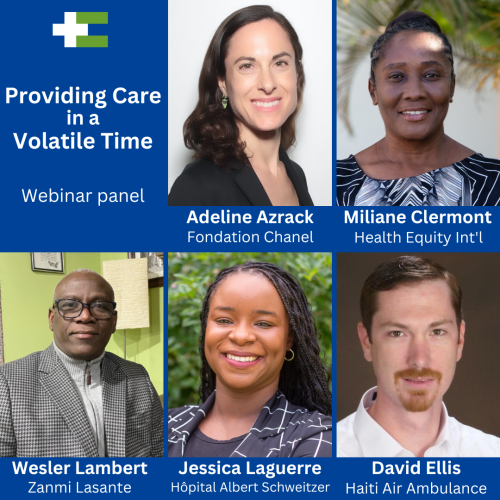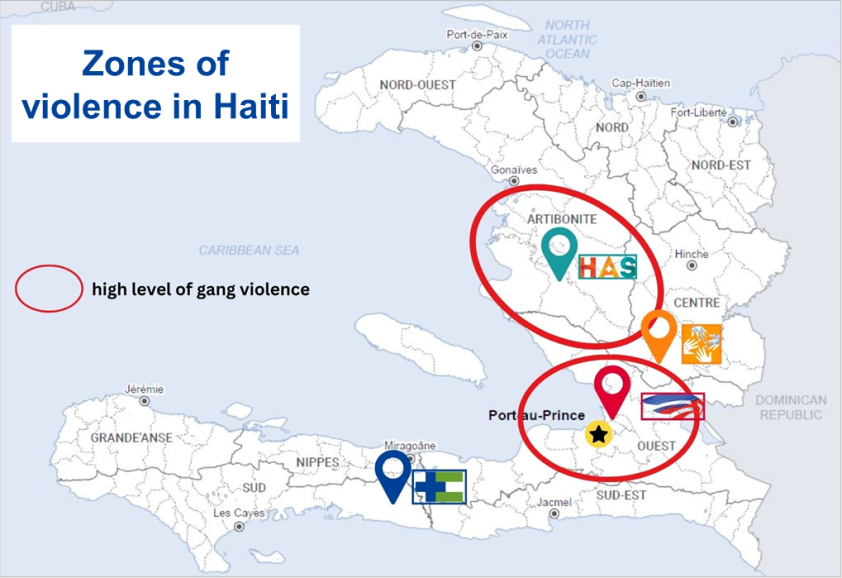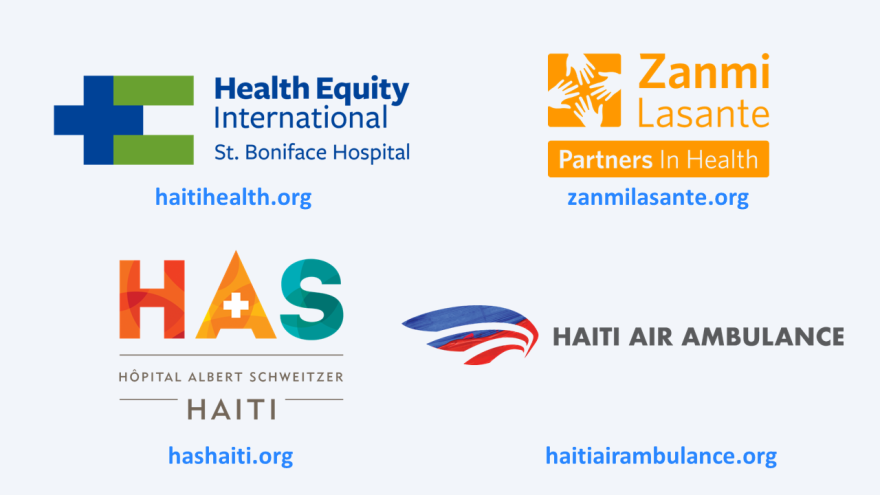Providing Care in a Volatile Time

On April 23, 2024 HEI convened a panel of healthcare providers in Haiti to discuss how the ongoing humanitarian crisis is impacting healthcare delivery.
The panel included:
- Dr. Miliane Clermont, Director General of St. Boniface Hospital
- David Ellis, Executive Director, Haiti Air Ambulance
- Jessica Laguerre, Chief Operating Officer, Hôpital Albert Schweitzer (HAS)
- Dr. Wesler Lambert, Interim Executive Director, Zanmi Lasante
Adeline Azrack, Managing Director at Fondation CHANEL, served as moderator. She began by acknowledging that there are many crises in the world, all competing for our attention and emotional energy. “Haiti needs to be kept at the forefront of our minds,” she said. “European countries and the United States have done a lot to both create the situation in Haiti and perpetuate it… We have a duty to stay present.” Adeline recapped four recommendations for donors, drawn from our June 2023 Strength in Partnerships webinar:
- Fund networks. “Networks are stronger and more resilient than individual institutions alone.”
- Fund agility. “Make your funding as flexible as possible.”
- Fund predictably, for example through multi-year grants.
- Support health workers as well as patients.

Gang violence is especially prevalent in metropolitan Port-au-Prince and the Artibonite region.
In response to a question about what has changed since the last webinar, all of the panelists agreed that the crisis has gotten worse. Gang violence has increased, not only in Port-au-Prince but also in the Artibonite and on the road from Port-au-Prince to the South. This makes it very difficult for our organizations to source medical supplies, drugs, and fuel. We stock up when we can do so safely, although transportation costs have in some cases more than doubled. In addition, many of our clinical staff are unable to return to their families in other parts of the country and fear for their safety. Two Haiti Air Ambulance staff members were even forced out of their homes by the violence. Our organizations are providing mental health support and creatively addressing other staff needs to retain health workers.
At the same time, the violence impacts our patients’ ability to earn a living, whether they are farmers, traders, laborers, or other workers. Nearly 5 million Haitians are experiencing high levels of acute food insecurity, which leads to more pregnancy complications and more malnourished children. As Jessica Laguerre put it, “We are big on education and awareness. In our community health [work], we’re preaching best practices—but what we’re seeing is families just cannot afford the best practices right now.”
Jessica continued, “We’ve been in this crisis for so long. We’re going above and beyond, because this is healthcare and this is a right, and there should be healthcare in all conditions, no matter if it’s war, no matter this—what’s going on in Haiti now—but I think we’re out of creative solutions because they’ve been embedded in our regular operations for some time now. There needs to be a real change in Haiti for us to continue doing this work and have the same impact.”
Asked about how they have worked together as a network, David Ellis replied, “All of us have realized how essential collaboration is. We have worked together so much now that we all have a personal stake in each institution’s success.” Dr. Wesler Lambert shared an example: when Zanmi Lasante was close to running out of IV fluids, putting patients’ lives at risk, Hôpital Albert Schweitzer gave them IV fluids from their own stock. HAS is also working to build relationships with leaders of healthcare institutions in their immediate area.
From St. Boniface Hospital, on the other side of Port-au-Prince, Dr. Miliane Clermont spoke about continuing in partnership with the organizations on the call and also increasing partnerships with hospitals in the South.
We saw that partnership is the key to go through all those challenges. We exchange medicines and supplies between us, we continue to work with the Ministry of Health, we continue to do trainings that we have planned to do for other health facilities in the same alliance with us in the South. … We organize ourselves to see how we can keep [operating for] the most long-term possible, [to] continue to provide care to the population.
Dr. Miliane Clermont, SBH Director General
How Donors Can Support
Adeline suggested asking donors the question, “How are you in solidarity with Haitian-led initiatives?” To panelists, she asked, “How is support that we’re sending going to reach you?” Panelists stressed the importance of being transparent with donors about the security concerns and constraints on shipping and transportation. All agreed that unrestricted funding is more important than ever since it allows our organizations the flexibility to pivot as needed during this volatile time.

Dr. Lambert emphasized, “These organizations are saving lives in a time where most organizations [have] left the country. They are here to stay. I know it’s difficult to come down and see yourself, but you can look at these organizations’ record to see that the money is serving those it was expected to serve.”
Expressing the sentiments of all the panelists, Dr. Clermont said, “We feel your support, and we are very grateful. It allows us to have access to supplies and provide quality care.” She added, “It’s not just our region or our hospital, it’s a Haiti matter and now the crisis is not political anymore; it’s mostly a humanitarian crisis. We need to have Haiti’s problems [known] around the world.”
In closing, Adeline summarized four takeaways that complement the earlier recommendations:
- Trust Haitian health leaders. “The best solutions are found by the people closest to the issues. If you are a donor, you need to trust that these organizations know how to keep the money safe.”
- Prevention has never been more important. “Fund preventive health care and public health. Invest in the full continuum of care.”
- Keep things local as much as possible. “Hire local, buy local. Expatriate support is valuable—and we’ve seen how self-sustaining organizations in Haiti can be. Greater Haitian leadership in boards will help institutions be more accountable to the local population.”
- Advocate. “All of us have a role to play in advocating for these recommendations and for keeping a focus on what is happening in Haiti and remembering that Haiti is not just its politics. Life goes on for ordinary, everyday people.”
Watch the full webinar here:
